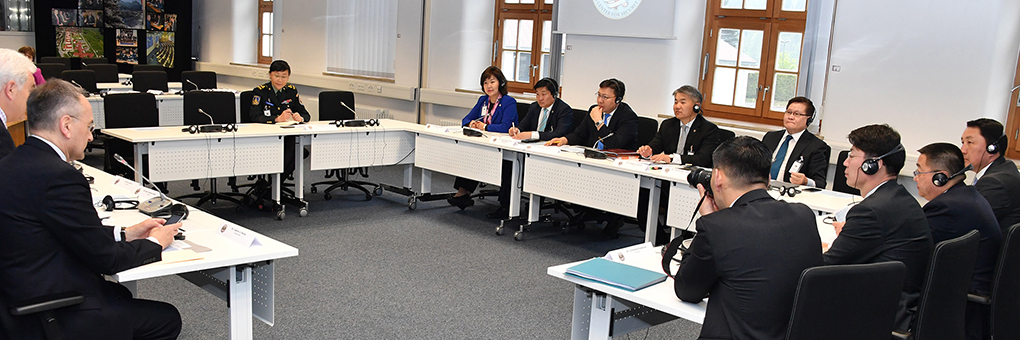
Mongolian Parliamentarians,'Third Neighbors' Meet at Marshall Center
By James E. Brooks
Public Affairs Office
George C. Marshall European Center for Security Studies
A delegation of five parliamentarians and seven senior government officials from Mongolia spent three days at the George C. Marshall European Center for Security Studies discussing their roles and responsibilities in a democratic society, May 9-11.
“Our partnership with Germany, through the Marshall Center, is very important for Mongolia,” said Enkhbayar Jadamba, former defense minister now parliamentarian and chairman of the Standing Committee on Security and Foreign Policy. “Out of three million people in Mongolia, 30,000 are studying here in Germany and learning the language. We like to think of Germany as a third neighbor.”
The Marshall Center coordinates approximately 12 tailored seminars each year. Seminars are typically requested by the respective U.S. or German embassy or defense agency. Parliamentarians who attend the seminar are most times, newly elected and come from the full spectrum of political parties in their nation.
“Mongolia and Germany have a long history and they want to continue this relationship that began over 40 years ago with East Germany and Mongolian People’s Republic. We hosted our first tailored seminar with Mongolia in 2014. Since that seminar, only 1 parliamentarian is still serving. Two thirds of Mongolia’s 70-person parliament are freshman,” said Marshall Center Deputy Dean Sven Gareis.
FOCUS ON ROLE OF PARLIAMENT IN DEMOCRATIC SOCIETY
According to Gareis, the seminar was organized into two days of classroom work and a third day was spent in nearby Munich where parliamentarians visited the Bavarian state parliament and offices of one of Germany’s leading political parties.
“The Mongolians are still seeking the best model for their parliament. They are facing a lot of challenges and they’re landlocked between Russia and China. They face intense scrutiny in their country and therefore must be careful about leaning too far to the west for guidance. They feel they are always under threat to be choked. Mongolia is in a tough situation and we’re here to help them navigate the maze,” said Gareis.
Classroom discussions included parliamentary oversight of law enforcement agencies; fighting corruption; oversight of the military; and panel discussions between U.S. and German representatives who shared examples of how national security challenges were handled.
“The trust was good and the discussions were extremely useful to them. These parliamentarians are committed to the serious work of strengthening their nation,” said Gareis.
GERMAN-AMERICAN PARTNERSHIP GUARANTEED SEMINAR SUCCESS
With nearly a dozen tailored seminars for parliamentarians from eastern European and Central Asian nations each year, the Marshall Center orchestrates a complicated agenda that includes nine other resident courses. Gareis said the timeframe of this seminar was imperative given the political calendars of Mongolia and Germany. Both nations have upcoming elections and the window of opportunity to bring the right people together was narrow. If it didn’t happen now, it probably would have to wait until 2018.
The Marshall Center can juggle many variables and constraints to make a seminar like this one successful but an uncontrollable obstacle emerged that threatened to cancel the seminar: the lack of a final U.S. defense budget or continuing resolution.
“Travel arrangements for these parliamentarians could not be finalized because of the lack of a U.S. budget after April 28th” said Dean Dwigans, Chief of Operations & Deputy Non-Resident Programs. “This seminar was very important to the Marshall Center, and in particular our German partner, and rather than risk cancelling the seminar at the last minute because of the lack of a U.S. budget, the Bundeswehr stepped in and took responsibility for the event funding and ticketing of all travelers under the umbrella of our memorandum of agreement” said Dwigans.
A unique partnership between Germany and the United States gave the Marshall Center flexibility the other four DoD centers for security studies don’t enjoy. Last October, U.S. Deputy Secretary of Defense Robert Work and German Parliamentary Secretary to the Federal Minister of Defense, Dr. Ralf Brauksiepe renewed a 1994 memorandum of agreement that increased Germany’s role at the center. The new agreement not only committed Germany to a greater investment of personnel and funds but it gave the Germany’s Federal Ministry of Defense a louder voice on programs they prioritize.
“This is not the first time the Bundeswehr has provided this kind of assistance. But it does show one of the many positive benefits of our strong German-American partnership that allowed this important event to continue seamlessly when a new U.S. budget was still being resolved.” said Dwigans.
MARSHALL CENTER HAS PLAYED KEY ROLE IN GERMANY-MONGOLIA RELATIONSHIP
The Marshall Center is often used as a location for bilateral staff talks by U.S. and German officials. In August 2009, German and Mongolian defense officials met here for a series of discussions. One of the most important decisions that came from those talks was an agreement that Mongolia would provide the security force for German troops deployed to Afghanistan under the NATO-framework of the International Security Assistance Force.
Germany is the third largest contributor to ISAF and leads the Regional Command North based in Mazar-i-Sharif. Mongolia deployed an infantry platoon there in March 2010.
